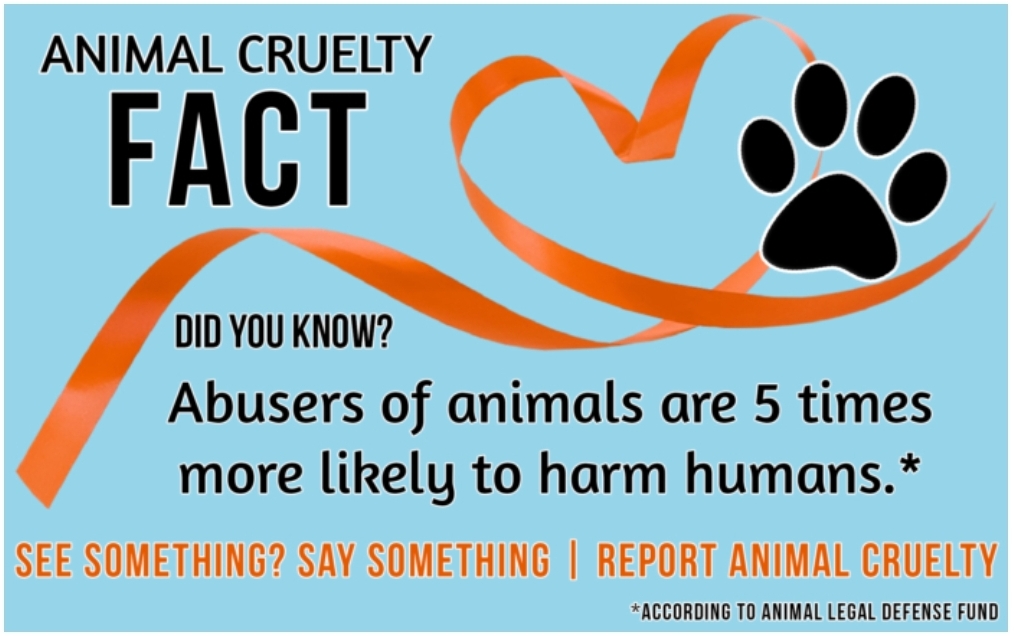
ANIMALS 101 – GO ORANGE IN APRIL IN SUPPORT OF PREVENTING CRUELTY TO ANIMALS.
When was the last time you heard of anyone tuning themself in for animal abuse? It just doesn’t happen often, if at all. Preventing animal cruelty is in all of our best interests. Animal cruelty is not only abhorrent in its own right, but it is often a gateway crime to violence against adults and children.
We are committed to breaking the cycle and to help us stop animal cruelty, you need to understand the problem or how you might be contributing, recognize the signs, report it and help educate others to prevent it.
We follow the 5 (6) freedoms of animal welfare:
- Freedom from hunger & thirst.
- Freedom from pain, injury, disease.
- Freedom from discomfort.
- Freedom from fear & distress.
- Freedom to express natural behaviours.
- Our hope for all wildlife is to be free.
Also read: ANIMALS 101 – BAD EXCUSES FOR GIVING PETS AWAY!
1. UNDERSTANDING THE PROBLEM
What you might see on Facebook and social media is not even the tip of the iceberg. Our hearts break every day for the hurt that is out there. A few facts about animal abuse:
- The abuse of pets and animal companions is a daily occurrence.
- Many animals suffer multiple forms of abuse, with the most common type of abuse being neglect and abandonment.
- Cases of animal abuse include neglect, shooting, stabbing, fighting, beating, mutilation, torture, strangulation, rape, cannibalism, burning and poisoning.
- Most animal abuse is never reported.
- Dogs and cats are the most common victims, but abuse happens among other animal species, including domestic farm animals, wild animals, small pets, birds, etc.
- Although there are bad people, the ANIMAL OVERPOPULATION is a massive problem, especially among cats and dogs. If there were fewer animals, with enough “good homes”, fewer animals can land in the wrong hands.

The Humane Society divides cruelty into two kinds: direct violence and neglect.
Direct violence. Signs include open wounds, multiple scars, limping, or difficulty walking. Many dogs that suffer direct violence will also display behaviours such as hiding, walking with their head down and tail between their legs, or cringing when people approach. Since those can also occur for other reasons, those behavioural signs alone shouldn’t be taken as definitive proof that a dog is being hurt.
Neglect. Most people don’t go so far as to lay hands on their dog to hurt them, but what happens with far too many owners is just as bad: they neglect the needs of their dog/pet.
11 SIGNS OF CRUELTY
1 – Poor body condition and noticeable trauma.
2 – Lack of food or water.
3 – Lack of shelter.
4 – Lack of sanitation.
5 – Abandoned.
6 – The animal is tied or caged.
7 – Chains, ropes, wire, or padlocks around the animal’s neck.
8 – Signs of an animal being trained to or having been used to fight.
9 – The animal’s behavior is abnormal.
10 – Too many animals living on one property/hoarding.
11 – Overt acts of violence.
Now that you better understand the problem better, know what to look for and how to report it, let’s look at ways you can help us fight cruelty.
ALWAYS REPORT CRUELTY! If you notice an animal that appears to be suffering, call your local animal welfare agency (mainly the SPCA in SA) immediately! Do not send a message or email or do this through social media as we lose precious time! Call until they answer! It can always be done anonymously and even if you are unsure, rather report so the SPCA can investigate. Save your local SPCA office and emergency numbers on your phone. Also include the numbers of the areas where your friends or family stay or where you visit frequently. You can find an SPCA near your location by following this link.
TIPS TO HELP PREVENT CRUELTY TO ANIMALS
- Be a responsible pet owner, including sterilizing your pets and keeping them safe in your yard.
- Don’t support breeders (in any form), pet shops, zoos, aquariums, petting farms, or the circus.
- Be an example of kindness to all animals.
- If you can ADOPT!
- Intervene if you witness animal cruelty, abuse, or neglect.
- You can keep food, water and a blanket in your car to help animals in need.
- If you find an animal that is injured, take them to your Vet or the SPCA.
- Teach your children to have respect for animals. Set a good example.
- Know the legislation & support legislation that promotes kindness to animals.
- Educate people around you about cruelty.
- Offer help to people who are overwhelmed with their animals.
- Volunteer in animal welfare, whether it is by fostering, helping at kennels, sharing posts, or by donating to those that do the work.
- Use cruelty-free products like skin/body/hair/make-up. The www.humaneguide.co.za are products brands endorsed by Beauty without Cruelty (South Africa), that do not test on or pay for testing on animals.
- If you are not vegan or vegetarian, only buy ethically sourced animal products.
- Rethink the products you buy like leather, down feather bedding, fur products, etc.

SHOW YOUR SUPPORT IN APRIL!
- Download this cover photo above and add it to your profile.
- Add a frame to your profile picture.
- Tie an orange ribbon outside your home.
- Share posts to educate about animal cruelty.
- Wear an orange ribbon or clothing.
- and more………
Preventing animal cruelty is no an easy task, but with your help, we CAN DO THIS!
Next week we will look at the animal issues surrounding Easter time.
WHEN YOU KNOW BETTER, DO BETTER!